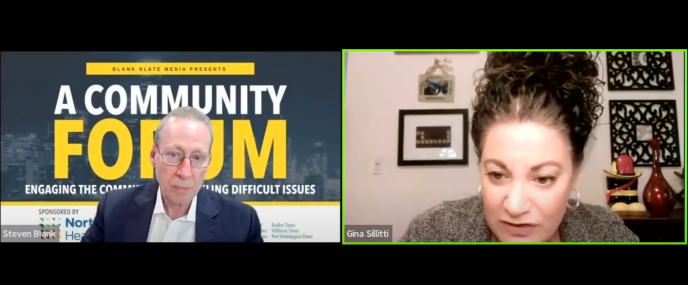State Assemblywoman Gina Sillitti (D-Manorhaven) highlighted her accomplishments and answered questions about bail laws, gun control, housing and congestion pricing in a recent interview with The Island 360.
Sillitti has been the Assembly District 16 representative since 2021. She is vying for re-election on the Democratic and Working Families Party lines.
“I’ve been able to deliver a lot for the district in the first year in 10 months that I’ve been in office,” said Sillitti. “I look forward to continuing that work for as long as the voters will have me and I hope that will be for many years to come.”
Her opponent, Vibhuti Jha, is running on the Republican and Conservative lines. A debate between the two candidates was planned, but Jha withdrew hours before it began.
Sillitti spoke about her “budgetary deliverables” when asked about her accomplishments. She said state aid in District 16 has increased by 42% during her time in office. She also highlighted her dedication to infrastructure improvements.
“I’ve talked about it a lot. The Long Island Expressway [getting] repaved. Northern Boulevard, which is a nightmare, getting repaved,” she said. “These are real deliverables that we were able to bring to the state and to the district which I think is important because it affects people’s lives.”
When questioned on crime, Sillitti said that the government’s job is to not only ensure that residents feel safe but are safe.
Officials across the state, including Nassau County Executive Bruce Blakeman, who declared earlier this year that New York is in a “state of lawlessness,” said serial offenders return to the county to commit crimes.
“There are certain fixes that we needed to make in the budget to make people feel better,” said Sillitti. “One of them is common sense changes to bail, giving judges additional discretion for repeat offenders. Catalytic converter thefts and then car thefts. We added more gun crimes to bail eligible offenses, we gave more money to our TAs and made some fixes to discovery law.”
The conversation about crimes committed shifted to crime prevention. In particular, gun safety, which is one of Sillitti’s campaign’s points, entered the discussion. She also touted her support from law enforcement during her interview.
Sillitti said that she has “zero tolerance” for illegal guns and that current state rules surrounding firearm possession and their sale are insufficient. She added there is a happy medium where public safety can be assured without reverting to the past system, which divides those who have from those who don’t.
“I think that we can find that right balance,” she said. “I think I’m the person that could strike that right balance. And I believe law enforcement trusts me to find that balance and to be that person to advocate for them.”
Sillitti was among those in attendance when Gov. Kathy Hochul announced new initiatives to strengthen inter-agency enforcement in high-theft areas and legislation to combat catalytic converter heists last week. She mentioned this case as an example of how to tackle crime by enacting legislation as well as allocating finances.
“So we pass legislation that would sort of crack down on this problem,” she said, “but also giving law enforcement the tools they need to crack down on the people.”
With another significant issue in her district, housing, Sillitti noted that she rents her home because of the high cost of other possibilities.
“Before I moved in with my now-husband, I lived like every young person in a basement apartment,” she said. “Which I think is like a rite of passage for Long Island young people because that’s all we could afford.”
Sillitti said an issue with housing mandates comes from villages and their unwillingness to concede autonomy when they all have their own community plans and opinions on the matter. (Nassau County has 64 incorporated villages — Sillitti’s district has 26 of them.)
Sillitti said there is a middle ground to incentivize housing programs. This means that neighborhoods can benefit from extra housing without risking overcrowding and any problems that may result from it.
“There’s 100% a housing crisis,” she said. “I’m living it, and so many other people, my age and younger, are also living it. There’s just no place to go, there isn’t inventory and then the minimal inventory there is that’s affordable is being scooped up by people who have more and are building giant houses on it.”
As the conversation about housing went on, Sillitti’s views about congestion pricing also came up. The MTA’s proposed congestion pricing plan, according to the project’s environmental assessment, could increase the daily entry fee into Manhattan. The plan calls for a toll to enter a zone that extends from 60th Street to the Battery.
Sillitti said the COVID-19 pandemic has affected travel patterns, which makes using data from pre-2020 potentially not as reflective of the current situation as it could be. She added that having public hearings occur during an election year was a poor decision.
“We’re too reliant on our cars when we have some of the best transportation systems in the world,” she said. “I wish more people would use mass transit. But they don’t. People go into the city for hospital visits and all these kinds of things. And they feel like they shouldn’t have to pay for that.”
The congesting pricing proposal seeks to lessen traffic while generating funds for upcoming transportation improvements. MTA officials say these changes will have a positive impact on the environment, the economy and emergency response times.
Sillitti said there haven’t been “real, honest” debates about congestion pricing and the issue has become politicized. As a result, she argues that different arguments, which offer differing claims, don’t help anyone.
One can view the interview in its entirety on The Island 360’s YouTube channel.

